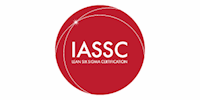
IASSC Lean Six Sigma Yellow Belt (Exam Included – With Retake)
Provided by Hudson - an IASSC Accredited Training Organisation (ATO)
Hudson
Summary
Spread your payments over a maximum of 12 months.
- Exam(s) / assessment(s) is included in price
- Tutor is available to students
Add to basket or enquire
Overview
Key Points
- Provided by an IASSC fully Accredited Training Organisation (ATO): Hudson
- Exam fee paid for/included to sit the official IASSC exam and get certification from the IASSC
- Exam retake in the event you fail the exam on the first attempt
- Official exam can be sat at home or in the office
- Upon successful completion of the final exam, you will receive a certification from the IASSC confirming you are fully Six Sigma Yellow Belt certified
- 12 months access to course material
Course Features
- Online training material
- Downloadable course notes
- Interactive knowledge checks
- Minitab exercises
- Interactive quizzes
- Sample test paper
Course Duration
- Total duration: 80 hours
About the certification
Upon successful passing of the official IASSC exam, you will receive a Certificate, suitable for framing, issued by the International Association for Six Sigma Certification. You will also receive the IASSC Marks/Logos and IASSC Marks/Logos Usage Policy which may be used on public profiles such as LinkedIn. You may use the designation ICYB (International Association for Six Sigma Certification Certified Six Sigma Yellow Belt), and IASSC Certified Yellow Belt or any approved variation of the designation after your name in accordance with the IASSC Marks Usage Policy.
Certification
Yellow Belt Level
Course media
Description
What does this course cover?
Hudson Intro
- Hudson Intro
Welcome & Instructions on Using this Course
- Welcome & Instructions on Using this Course
- A Note on Accessing the Quizzes
IASSC Lean Six Sigma Yellow Belt: COURSE NOTES
- DEFINE – IASSC Lean Six Sigma Yellow Belt – Course Notes
- MEASURE – IASSC Lean Six Sigma Yellow Belt – Course Notes
- CONTROL – IASSC Lean Six Sigma Yellow Belt – Course Notes
- Content Exclusively Covered in the Course Notes
IASSC Lean Six Sigma Yellow Belt: INTRODUCTION
- INTRODUCTION
IASSC Lean Six Sigma Yellow Belt: DEFINE PHASE
- DEFINE – Phase Intro
- 1.00 DEFINE – Course Structure
- 1.01 DEFINE – Introduction to Six Sigma
- 1.02 DEFINE – Steps & Tools
- 1.03 DEFINE – The Cost of Poor Quality
- 1.04 DEFINE – Six Sigma Metrics
- 1.05 DEFINE – Lean
- 1.06 DEFINE – Project Charter
- 1.07 DEFINE – Phase Summary
- 1.08 DEFINE – Case Study: Building a Business Case
- 1.10 DEFINE – Case Study: Pareto Chart Applications
- 1.11 DEFINE – Knowledge Check 1 (4 tasks)
- 1.13 DEFINE – Knowledge Check 2 (4 tasks)
- 1.12 DEFINE – Knowledge Check 3 (1 task)
- 1.14 DEFINE – Knowledge Check 4 (1 task)
- 1.15 DEFINE – Quiz
IASSC Lean Six Sigma Yellow Belt: MEASURE PHASE
- MEASURE – Phase Intro
- 2.00 MEASURE – Course Structure
- 2.01 MEASURE – Process Mapping Overview
- 2.02 MEASURE – Types of Process Map
- 2.03 MEASURE – Inputs to the Process
- 2.04 MEASURE – Cause & Effect Diagrams
- 2.05 MEASURE – X-Y Matrix
- 2.06 MEASURE – FMEA
- 2.07 MEASURE – Basic Statistics – Part 1
- 2.08 MEASURE – Basic Statistics – Part 2
- 2.09 MEASURE – Graphs
- 2.10 MEASURE – Measurement Systems Analysis (MSA) Overview
- 2.11 MEASURE – Measurement Systems Analysis – Continuous Data
- 2.12 MEASURE – Measurement Systems Analysis – Quantitative Data
- 2.13 MEASURE – Stability
- 2.14 MEASURE – Capability Analysis
- 2.14 (a) MEASURE – Calculating Capability Statistics (by Tamela Serensits – Master of Applied Statistics M.A.S)
- 2.15 MEASURE – Capability Analysis – Non-Normal Data
- 2.16 MEASURE – Phase Summary
- 2.17 MEASURE – Case Study: Measurement System Analysis
- 2.18 MEASURE – Knowledge Check 1 (4 tasks)
- 2.20 MEASURE – Knowledge Check 2 (4 tasks)
- 2.19 MEASURE – Knowledge Check 3 (1 task)
- 2.21 MEASURE – Knowledge Check 4 (1 task)
- 2.22 MEASURE – Quiz
IASSC Lean Six Sigma Yellow Belt: CONTROL PHASE
- CONTROL – Phase Intro
- 5.00 CONTROL – Course Structure and Overview
- 5.01 CONTROL – Final Capability, Lean Controls
- 5.02 CONTROL – Control Plans
- 5.03 CONTROL – Center Line & Control Limit Calculation, Control Plans
- 5.04 CONTROL – Phase Summary
- 5.05 CONTROL – Case Study: The Control Plan
- 5.06 CONTROL – Knowledge Check 1 (4 tasks)
- 5.08 CONTROL – Knowledge Check 2 (4 tasks)
- 5.07 CONTROL – Knowledge Check 3 (1 task)
- 5.09 CONTROL – Knowledge Check 4 (1 task)
- 5.10 CONTROL – Quiz
IASSC Lean Six Sigma Yellow Belt: CONCLUSION
- CONCLUSION
IASSC Lean Six Sigma Exam Prep Webinars
- IASSC Lean Six Sigma Exam Prep – DEFINE
- IASSC Lean Six Sigma Exam Prep – MEASURE
- IASSC Lean Six Sigma Exam Prep – CONTROL
IASSC Lean Six Sigma Yellow Belt: SAMPLE TEST PAPER
- Sample Test Paper – Questions
- Sample Test Paper – Questions and Answers
RESOURCE: Six Sigma Exam Reference Document
- IASSC Examination Reference Document
RESOURCE: Six Sigma Excel Templates
- DEFINE Templates
- MEASURE Templates
- CONTROL Templates
RESOURCE: Six Sigma Minitab Exercises
- WEBINAR (with Tamela Serensits) July (1) 2021. TOPIC: Introduction to Minitab
- Minitab Exercises – Series Intro
- DEFINE Minitab Exercises
- MEASURE Minitab Exercises
- CONTROL Minitab Exercises
About the exam
The IASSC Six Sigma Yellow Belt Certification closed book exam is made up of 60 multiple choice and true/false questions. Your time allowance for the exam is 2 hours, although you may finish the exam sooner if you are able to.
In order to achieve the professional designation of IASSC Certified Yellow Belt (ICYB) from the IASSC, you must score a minimum of 230 points out of a total 300 points.
Who is this course for?
Lean Six Sigma Yellow Belt is most beneficial for organizations that encourage employees to ensure efficiency in all business/industry processes. This certification is a good fit if you’re part of a Six Sigma Team working to improve a business.
Requirements
There are no entry requirements to start this course.
Questions and answers
Reviews
Currently there are no reviews for this course. Be the first to leave a review.
Legal information
This course is advertised on reed.co.uk by the Course Provider, whose terms and conditions apply. Purchases are made directly from the Course Provider, and as such, content and materials are supplied by the Course Provider directly. Reed is acting as agent and not reseller in relation to this course. Reed's only responsibility is to facilitate your payment for the course. It is your responsibility to review and agree to the Course Provider's terms and conditions and satisfy yourself as to the suitability of the course you intend to purchase. Reed will not have any responsibility for the content of the course and/or associated materials.



